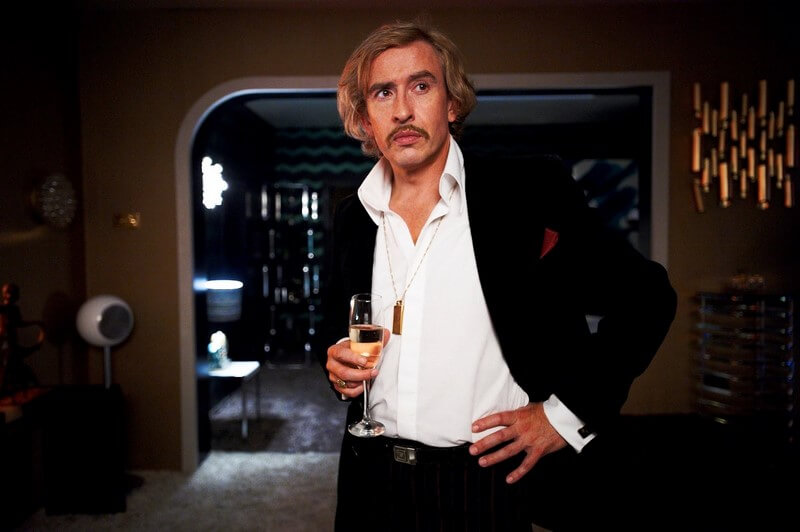Whilst American cinema is mourning the loss, due to early retirement, of indie heavyweight Steve Soderbergh , his trans-Atlantic equivalent Michael Winterbottom is still going strong, continually adding to his eclectic and astonishingly prolific oeuvre: The Look of Love represents his 23rd project in just 19 years.
Having so far embraced everything from post-modern period comedies (A Cock and Bull Story), Indie Porn (9 Songs), and war-based features (Welcome To Sarajevo), Winterbottom's latest movie marks something of a return to familiar territory for the director; putting an askew slant on the biopic genre as previously explored in 24 Hour Party. Teaming up with Steve Coogan (for the fourth occasion) to tell the tale of The Look of Love, Winterbottom's uniquely British-feeling movie combines the unrelenting charisma of it's leading man with the equally unstoppable creative tics of it's auteur.
The Look of Love is the tale of Paul Raymond, the oleaginous and sleazy proprietor of the "World Centre Of Erotic Entertainment" - a Soho based centre of nude theatres and top-shelf magazines which provided the unlikely backdrop for an underground empire and Raymond's title of the richest man in Britain. He is also an individual who, at the height of his infamy, was prone to cocaine-fueled debauchery and, somewhat more idiosyncratically, spouting lines such as: "We've got dolphins pulling knickers off girls, what's not to like?"
As Raymond reaches the final few laps of his existence he begins to resemble the elderly lion in folk tale; the wounded animal who observes although they are weak now, they once were king (in this case, of Soho). It is this creeping, ominous mortality which gets Raymond to consider his legacy, his life and how his decisions have affected his ex-wife (Anna Friel), his lover (Tamsin Egerton) and, ultimately, his tragic daughter Debbie (Imogen Poots); it is ultimately these three relationships which reflect both the depths and simultaneous shallowness of his character and without whom it would be much harder to envisage who Raymond was and what made him tick. It is, however, these characters themselves that reveal the greatest flaw in The Look of Love - Raymond was simply the least interesting character in his own life (or at least the version of it presented in Matt Greenhalgh's script).
As a man who made his fortune in dealing with ribald images and depictions of women, Raymond's own narrative is ultimately defined by his relationship with the opposite sex - in some ways it is his showy exploitation of explicit images of females which lie at the essence of Raymond's character yet, rather more interestingly, he is as equally defined, by the end of his life, in context with three ladies who surround him in his more personal, and vulnerable, private bearings. His narrative arc seems to consist primarily of "rich man embraces hedonism" through to "richer man continues hedonism" with a few shots of a wistful looking elder gent added for pseudo-profundity. In contrast to the cautionary, pathos-filled tale of Debbie's wide-eyed ingenue whose life is corrupted by the vapid world she was had the misfortune to be born into, Raymond's tale is much more suited to a supporting role used to provide context alone. Oftentimes it seems Raymond exists solely to allow hi-jinx and "knockabout larks" to unfold on screen - like Soderbergh's Magic Mike, the whole first half of the film seems to be about having fun with a cast of background players all in various levels of undress... before the movies both respectively realised a plot had to occur at some point, paving way for a finale based on the "dark side of taking drugs".
Yet, overall The Look of Love is a rather fun feature - Michael Winterbottom is a director who has mastered his craft and managed to effortlessly seam together, with a weightless grace, a script which at points could have veered on being overly episodic and vignette-heavy. Steve Coogan is, as usual, a force of nature on screen displaying an incredible range in his performance; whether portraying a flamboyant Oscar Wilde-inspired showman or a vulnerable and pensive Johnny Cash-esque elderly man pondering his life, he is as believable as he is captivating. The real star of the show, however, was Imogen Poots who smouldered and broke with equal convinction in her poignant role. The highlight of the entire feature saw the camera linger statically on her face against a black backdrop as she sung the title theme to the movie; a set-piece which wrung real emotion in a non-melodramatic or contrived manner. A sublime ending to a film which oftentimes bordered on the ridiculous yet which, despite its faults, was never anything less than entertaining.
* This film was part of Bradford International Film Festival


No comments
Post a Comment